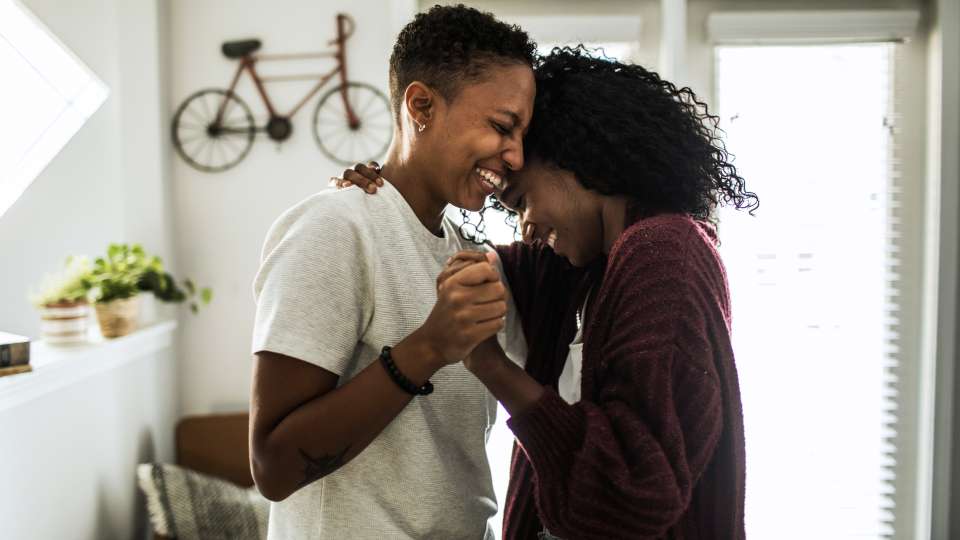5 Tips for Being in a Relationship With a Person With ADHD

So you’ve fallen in love with a person with attention-deficit/hyperactivity disorder (ADHD). When you first started dating, you were flattered by the way they focused on you and made you feel like nothing else mattered. You found their spontaneity and adventurousness attractive and exciting.
The challenges of sharing a life with a person with ADHD didn’t become apparent until after the infatuation stage, when you started settling into a long-term relationship. All of a sudden, your partner seemed distracted by other things and never listened when you asked them to do something. After you moved in together, you realized how disorganized they are and how hard it is for them to stay on top of household tasks. You wouldn’t be alone if you started doubting whether the relationship could last after you’ve repeatedly voiced your frustration about the chaos and poor communication, and nothing has changed.
In fact, ADHD symptoms like being inattentive, distractible, impulsive and forgetful lead to high rates of relationship failure — and the partner without ADHD is often the person to give up hope.
“Individuals with ADHD are at a much higher risk for marital conflicts and divorces,” says Dr. Mark Stein, a psychologist and professor of psychiatry in the UW School of Medicine’s Department of Psychiatry and Behavioral Sciences, whose clinical research focuses on ADHD treatment. “Untreated ADHD is not a benign disorder.”
Your relationship is not doomed to fail, however. Here are steps both partners can take to transcend many of the common challenges of living with ADHD.
Learn what ADHD is (and isn’t)
ADHD is a lot more common in adults than previously thought. An estimated 11 million adults in the U.S. have it, but many don’t know, especially if they weren’t diagnosed as children.
“The major issue with adult ADHD is not recognizing it and not getting treatment for it because it’s more subtle than in kids,” says Stein.
While the hyperactive kind of ADHD is often more obvious, the inattentive type is easier to miss but much more prevalent in girls and women and as people with ADHD get older. Social media has played a key role in increasing awareness about what ADHD can look like for adults. It’s important, though, not to try to self-diagnose but to go to your primary care doctor or a mental health expert. ADHD can often be confused with, or exist alongside, something else that needs to be addressed, like anxiety or depression, or even a sleep disorder or hypothyroidism.
An official diagnosis of ADHD can be a huge relief for both partners — it often comes with the realization that there is a treatable reason for many of the conflicts and struggles you’ve been having.
Get treatment — and keep the partner involved
The next step is to start addressing the ADHD symptoms.
“Medication is often part of a treatment plan, and we know that medications for ADHD help reduce some of the symptoms,” says Stein. “But the medications always wear off, so usually that’s just part of the treatment.”
The other piece is coming up with tools and creating environments for your partner with ADHD to thrive (more on that below). And you can be a huge help on that front.
“We know a lot about ADHD and how to treat it, and a key thing is being in a good relationship and having a spouse or partner who can support them,” says Stein.
So, go to appointments with your partner’s doctor or psychiatrist, if possible, and be involved in their treatment plan. More than anyone else, you see your partner’s behaviors, including some they might not be aware of — and you bear the brunt of them, too. You can provide their doctor with helpful information and support your partner in sticking to good habits that will help their ADHD, like getting enough sleep, exercising regularly and remembering to write things down in a planner or to-do list.
And it’s important to educate yourself, too. Read about the condition and understand what the symptoms can look like for different people — from forgetfulness to mood swings to trouble starting or completing tasks.
Understanding how the disorder can make something like time management very difficult will allow you to better empathize and adjust your expectations for what is realistic for them, especially when it comes easily to you. Behaviors you might have chalked up to them not caring, like being late or forgetting important dates, might not be personal at all.
Don’t let ADHD become an excuse
While it’s crucial to understand what ADHD is and how it affects your partner’s behavior, it’s important not to let it be a reason for the person with ADHD to shirk responsibility or shut down in conversations.
“You don’t want to use ADHD as an excuse,” says Stein. “You need to make extra effort to make up for it.”
Yes, it can be more challenging for people with ADHD to remember and plan ahead for things like birthdays and anniversaries. But that doesn’t make it OK to forget them. Instead, they need to take extra steps to compensate, like adding calendar reminders a month in advance or blocking off time in the week to research dinner reservations or gift ideas.
Similarly, it’s not OK for you to take on more household responsibilities just because you’re better at staying on top of them. This can quickly lead to learned helplessness for your partner with ADHD and resentment from you.
Play to each person’s strengths
Being in a relationship with a person with ADHD often results in both of you getting stuck in the same roles. People with ADHD, after a lifetime of being told they’re not good enough, frequently have low self-esteem and carry a lot of shame about not being able to do things that should be easier for them to do.
Meanwhile, you are probably tired of being the manager in the relationship — the person who keeps on top of chores and gets everyone out of the house on time. The cognitive load of thinking for two people can quickly become exhausting.
While it’s understandable to nag or become frustrated at someone with ADHD for poor organization or forgetfulness, criticizing them is probably only going to make them feel more ashamed and more likely to shut down. Overhelping is only going to make both people resentful in the long run.
Similarly, your partner getting angry at you for being controlling or impossible to please will result in you feeling like the extra work you do isn’t being appreciated — and you probably don’t like being a nag any more than they like being nagged.
Instead, it’s important to focus on the positive things each person brings to the relationship and how you can play to them.
“You really have to look more broadly at what your strengths and weaknesses are and what you can do to minimize the weaknesses and build up the strengths,” says Stein. “That’s really the key to treatments and the key to successful relationships.”
For example, people with ADHD can often hyperfocus and get a lot done in a concentrated amount of time — it just might happen at 10 p.m. So, while you might be tempted to tackle the pile of dishes in the sink right after dinner, if it’s your partner’s turn, trust that they will get it done in their own way and on their own timeline.
If your partner knows they get a burst of productivity before bed, maybe that’s the time for them to pack their bag for the hike the next day, if they know they’re slow to get out of bed and you are often the one to pick up the slack.
And if you are genuinely better at, say, keeping track of the social calendar and don’t mind doing it, that’s fine as long it’s communicated and agreed upon, and your partner doesn’t take it for granted.
Schedule a weekly household meeting
Stein says the key to tackling these kinds of relationship dynamics is good and frequent communication. And that can be a challenge for a couple dealing with ADHD.
One strategy is a weekly household meeting, in which you, as a couple, put time on the calendar to talk about life responsibilities and stresses. If one partner is worried about finances (ADHD people are often not the best at budgeting), they can bring it up then. If the other feels like they’re not being given a chance to take on more of the house cleaning and management, they have the space to express that. If an especially busy week or stressful event is coming up, like hosting family or a big deadline at work, the house meeting can be used to come up with a plan to get organized and support each other.
Of course, making explicit time and space for this kind of communication is beneficial for any couple, but it’s especially crucial if one person has ADHD. It takes extra cognitive effort for people with ADHD to concentrate on what someone is saying and a longer time to process it, especially if it involves complicated information. So, bringing things up on the fly will often result in frustration when your partner isn’t giving you their undivided attention or when what you’ve asked them to do clearly hasn’t stuck. For your partner, having a set time to stop and be totally present with you will make it easier for them to absorb what you are saying and think through a plan that will work for both of you.
Try couples counseling, even if you don’t think you need it
ADHD can lead to serious relationship issues, and if a weekly household meeting isn’t quite enough, it might be time to look for a professional who can help.
“You want to make sure the relationships are maintained,” says Stein. “Marital therapy is really a helpful thing for couples that have ADHD, even if they’re not having really significant problems.”
Couples counseling can be a place to learn and reinforce the communication skills that are so crucial for a successful relationship with a person with ADHD. If your partner’s ADHD makes it difficult for them to listen to you, the structure of counseling might help, plus give you both new tools to use outside of the therapist’s office. For example, your partner repeating back what you said (maybe starting with, “What I hear you saying is”) will help you feel listened to and help your partner process what you are saying.
It can also be a safe space to deal with the really hard stuff. People with ADHD can have difficulty regulating their emotions, which can lead to outbursts of anger or saying things impulsively that can really hurt you. It’s also not uncommon for you, as the person without ADHD, to feel isolated and alone in the relationship. Having a professional to help you navigate those kinds of difficult dynamics can be what saves your relationship.
Finally, getting professional support is even more important if kids come into the picture. In fact, many adults realize they have ADHD when their child is diagnosed with it. ADHD is highly genetic: Stein says a third of the time a child has ADHD, someone else in their family will have it, too.
“If you’re a parent with ADHD, it’s especially difficult,” says Stein. “The increase in stress and household management is so challenging.”
ADHD can present challenges no matter what stage of life you’re in. But with the right support and treatment, your partner can thrive in a relationship — and so can you.
“People with ADHD who do have a supportive spouse or partner do really well in life — I think that that’s really the key,” says Stein.

 Healthy ideas for your inbox
Healthy ideas for your inbox







